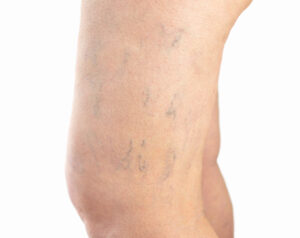Did you know that when you improve circulation you can support better vascular wellness? You may know that poor circulation can put your vein health at risk. But would you know if your circulation was already compromised? As it turns out, there are several early symptoms that you’ll notice when your circulation first becomes compromised. And we’re here to help you identify those warning signs, so you can see your vein specialist and get help to boost circulation right away.

When your circulation is sluggish, or not working as well as it should, you may notice that:
When your circulation is compromised, your metabolism may slow down. And that means you may gain weight, even if your diet and exercise routine remain the same. At the same time, poor circulation can keep you from losing weight, regardless of your exercise or dietary efforts. That's because slower circulation interferes with your body's fat-burning processes. So, unexplained weight gain AND difficulties losing weight could both be signs of poor circulation.
Now you know some of the warning signs of poor circulation, let's explore what causes those problems. Then you can learn how you can give your circulatory system a boost.

Many different issues can compromise your circulation. But certain conditions will almost certainly impact your blood flow. We'll take a look at the three worst offenders.
These bulging veins usually develop when your internal valves malfunction. That failure keeps blood from flowing up and out of your legs, towards your heart. It’s an obvious cause and symptom of poor circulation.
Indirectly, carrying extra weight makes movement more challenging. And when movement is challenging, you become more sedentary, which can decrease your circulation. Extra pounds also put more pressure on your legs—and the veins inside them—increasing your risk of varicose veins.
So, now you’ve seen some of the issues that can make problems for your circulatory system, let’s figure out how to boost your circulation!
The most important way to protect your circulation is to live a healthy lifestyle. And that includes dropping your nicotine habit if you smoke or vape, since it negatively impacts blood flow in your body. Additionally, you should strive to maintain a healthy blood pressure—have your levels checked regularly by your doctor, and try to maintain a reading of 120 over 80 (or lower.) If you aren’t in that optimal range, discuss ways of lowering your pressure with your healthcare provider.
Certain lifestyle habits can also help improve your circulation—especially good hydration. Since your blood is about half water, staying hydrated helps keep it flowing through your body. It’s also important to move frequently throughout your day. Sitting or standing in one spot for extended periods of time takes a major toll on your circulation. Simply taking more walking breaks can do wonders, but consider stepping up your aerobic exercise by incorporating regular 30-minute sessions into your weekly routine. Swimming and biking are great, low-impact options.
Adding stretching to your routine can also help! Stretching out different areas of your body helps send blood to your various muscle groups, so start your day with a five-minute stretch session, or build quick stretch breaks into your day.
Prefer to work on circulation while you sleep? Experts say that sleeping in a zero-gravity position (that means keeping your back flat, but lifting your head and feet a bit above your heart) can improve circulation and reduce your varicose vein risk. Sleeping on an adjustable bed makes it easy to get in this position. But you can pull it off with less expense by placing pillows at both ends of your bed.
Sounds too complicated? Here's a great (and relaxing) way to boost circulation: get a massage! With a medically-approved massage, gentle rubbing in areas where your blood pools could boost circulation. Thanks to moderate pressure, that blood may get moving, and that could improve circulation to the rest of your body.

Your diet matters, too, when it comes to circulation. Eat lots of fruits and veggies, and carefully monitor (and limit) your salt intake. Other foods that can improve circulation include garlic, ginger, turmeric, fatty fish and raw, dark chocolate. But you should also limit (or avoid) the saturated fats found in many cheeses and animal proteins, as they can lead to fatty build-ups in your arteries, which will further hamper circulation. Try adding green tea to your diet if you need to boost circulation. As few as two cups a day could relax your blood vessels. This could, in turn, widen them and help boost circulation and blood flow.
And, finally, if circulation problems are already seriously impacting your health, you may want to begin compression therapy. By wearing compression socks or stockings (which now come in a variety of styles and colors) you put enough pressure on your legs to help get blood out of the area and back up to your heart. This can improve your circulation and limit many of the symptoms associated with circulatory problems, like spider veins or heavy, achy legs.
If left untreated, circulatory problems can cause you to experience serious health problems. But if you take note of early warning signals, we encourage you to contact our vascular specialists in Texas . Together, we will work to improve your circulation, helping you avoid or even reverse any associated complications!

Scheduling
Please contact our dedicated specialists to schedule a consultation today.
2025 Texas Endovascular. All rights reserved. Website Design by Healthcare Success